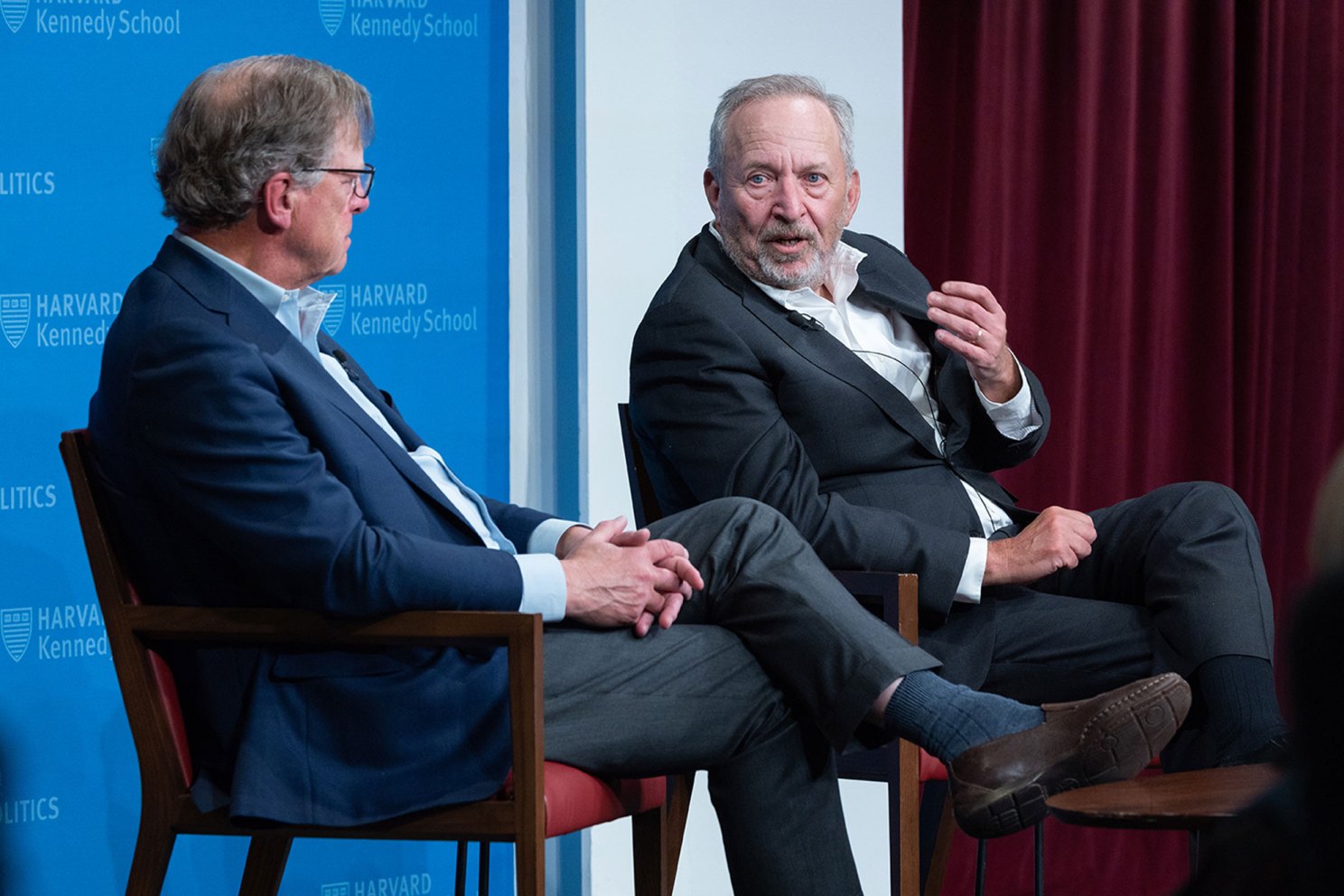
Lawrence Summers (right) talks with journalist John Ellis at Harvard Kennedy School.
Photo by Martha Stewart
Summers says Trump’s plans could damage economy
Professor and former Treasury secretary discusses why Democrats lost election, need for more patriotism
Democrats lost the 2024 election because they paid too much attention to positive macroeconomic trendlines and not enough to Americans’ economic reality, according to economist Larry Summers.
“In too many ways, Democrats have lost sight of the common man and woman in favor of the attitudes and philosophies of the faculty common room,” said Summers during a talk Thursday night on why the Democrats lost the 2024 election and the risks President-elect Donald Trump’s policy plans pose for the U.S. economy.
Many voters moved toward the Republican Party and Trump, who hammered Democrats over inflation, because they felt the GOP understood what they were going through better than Democrats, who strayed from their traditional focus on issues like kitchen-table economics, said Summers, who was Treasury secretary during the Clinton administration and is currently the Charles W. Eliot University Professor and the Frank and Denie Weil Director of the Mossavar-Rahmani Center for Business and Government at the Harvard Kennedy School.
The Federal Reserve also contributed to voters’ anger over inflation, he suggested.
In 2021, when $2.5 trillion in stimulus funding was flooding the economy, the Fed was still anticipating interest rates would stay at 0 percent through summer 2024 and buying back long-term Treasury debt by issuing “what was, in effect, floating-rate short-term debt.” This led to significant losses to the government that some estimate — in market value terms — at $500 billion to $1 trillion, before the Fed finally course-corrected, said Summers, who also served as director of National Economic Council during the Obama administration.
“I think that if there had not been hyper-expansionary policy in 2021, it would have been easier for Democrats to escape blame for whatever inflation took place,” he said.
Summers worries the Fed could err once again during the new administration given current economic conditions, and he warned Trump’s economic policy plans, such as raising or adding new tariffs, could worsen inflation.
“If President Trump does what he said he would do during his campaign, the inflation shock administered to the economy is substantially larger than anything that happened at the beginning of the last administration,” Summers said.
“He’s vowed huge deficit increases through continuation of his tax cuts and new tax cuts; he has trashed the idea of the independence of the central bank; he said that we should want to have a less highly valued currency, which means less valuable money [and] higher prices, and that’s just on the demand side,” he said.
More importantly, “He’s talked about a big tariff on every good that we import, which means higher import prices [and] also means higher prices for everything that competes with imports,” Summers said.
Summers criticized Trump’s promise to implement 60 percent tariffs on all Chinese goods, saying it will not only force American consumers to pay much higher prices, but will further strain U.S.-China relations. The U.S. ought to precisely “calibrate” its trade policies to the nation’s overall strategic objectives, he said.
“At a time when the Chinese economy is struggling, when there are very difficult economic problems, the worst thing we could do would be to make it completely easy for the Chinese government to scapegoat us for their own economic failings. And so, we need to be very careful that we are focused on our own security [and] … not pursue policies that can be interpreted as reflecting a generalized desire to suppress the Chinese economy,” he said, adding “That’s going to require subtle choices about policy and it’s going to require not bluster, but very careful communication.”
In addition, tightening U.S. borders is “clearly something we have to do,” he noted. “But if you’re talking about sending millions of people out of the country who are here now, that’s a prescription for large-scale labor shortages, and we’ve seen in the past what that does to inflation.”
Vice President Kamala Harris made a pitch to voters who “love our country,” a sentiment Summers said he’d like to see the Democratic Party and institutions like Harvard champion.
“I’d frankly like to see it as a value embraced more in our University, where it’s not something we talk about or celebrate or think about,” he said. “There’s plenty that we have done wrong in our history. But there’s something odd about the degree to which the history that is received in our educational system is as negative about our country as it is.”
The University needs to “find a way” to encourage patriotism as a positive principle on campus because the U.S. today faces “real threats” and because it is “an alternative to each subgroup of Americans embracing a particular identity, which leads to a great deal of divisiveness.”




